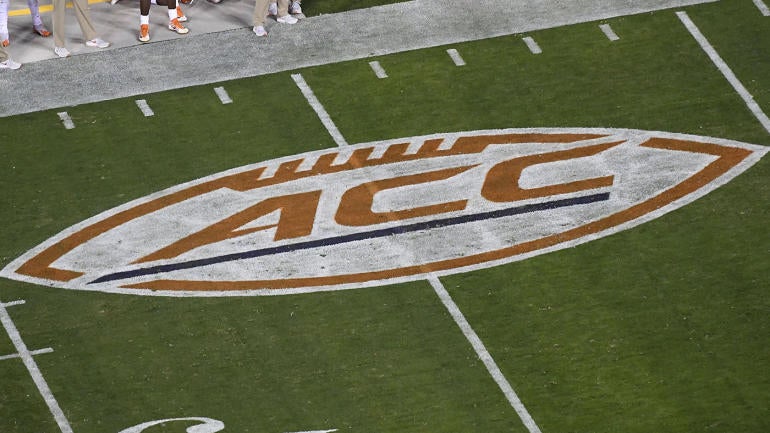
The Big Ten, ACC and Pac-12 are expecting to announce a long-awaited alliance within the next two weeks, sources tell CBS Sports. For now, the greatest influence the alliance is expected to have will be on future NCAA governance. Realignment among the three conferences is not part of their ongoing discussions.
The alliance became a priority after Texas and Oklahoma moved to the SEC. The talks between the Big Ten, ACC and Pac-12 were described by one source as a “non-aggression pact” against the SEC after the Big 12 was destabilized following the losses of the Longhorns and Sooners. That power grab tipped the scales toward the SEC in future college athletics dealings.
The Athletic’s Nicole Auerbach first reported that an announcement about the alliance could be made as early as next week. This just one week after CBS Sports and The Athletic reported the trio were actively engaged in discussions about forming a scheduling alliance.
Still to be determined is the structure, access and value of an expanded College Football Playoff. There has been substantial push back about slowing the timeline since the moves of Texas and Oklahoma.
“Some of things we’ve been doing to ourselves, that just needs to stop,” one high-profile official from a school within the would-be alliance told CBS Sports. “Some of this shit, we’re talking about expanding to 12. For two teams that [go all the way], that’s 17 games. We’re going to talk about ‘these kids aren’t professionals’ and we don’t pay them? I firmly believe in the academic value of what we’re doing, but at a certain point, it looks like professionals. … I firmly believe in the academic piece that we’re providing.”
That may be the central point of the alliance. College athletics remains wary of the SEC and ESPN dominating … everything. Big 12 revenues will decline by at least 50% with the losses of Texas and Oklahoma. It would serve ESPN well financially if the Big 12 were to fade away as that would be one less set of TV rights to pay out.
Even with an alliance, the SEC would likely maintain its advantage as the conference with the most best teams.
A scheduling alliance between the Big Ten, ACC and Pac-12, which has also been discussed, would enhance schedule strength and create interesting nonconference games, but any scheduling piece of an alignment would not have an immediate impact. The Big Ten and Pac-12 discussed a scheduling alliance in 2012. The discussions eventually fell apart, but back then, it was reported that it would take at least five years until nonconference schedules could be adjusted accordingly.
One Power Five athletic director speculated to CBS Sports that it could take 10 years to unwind nonconference schedules. One example: Michigan plays Oklahoma in 2026 and Texas in 2027. Does the program want to add another Power Five game from the Pac-12 or ACC in those years and then play a Big Ten schedule?
At a minimum, the alliance wants to be viewed as entity that shares similar views as the NCAA is in the process of being remade. A constitutional convention will be held in November to essentially deregulate college athletics. Going forward, the conferences will have more control over legislation.
There is already concern about the makeup of the committee that will provide recommendations for that convention. Five members were added to the original 23-person committee because of an outcry over lack of representation. One reason the NCAA is abdicating authority is because of its failed oversight of college football particularly the Power Five. NCAA president Mark Emmert is favoring a decentralization of authority whereby conferences have more input.
The alliance could have considerable impact — perhaps even more than the SEC — on what college athletics looks like off the field. The Big Ten, ACC and Pac-12 could — as a group — support a more conservative model similar to what exists today. The voting structure hasn’t been worked out, but Power Five conferences currently enjoy a weighted voting advantage in NCAA governance.
“I think it’s a big portion from my perspective,” said Michigan AD Warde Manuel of the alliance’s academic pursuits. “That’s going to be critical long term to what we do.”
While name, image and likeness rights appear to be here to stay, new governance could come down to issues such as roster sizes, coaching staff sizes, eligibility issues and requirements regarding athletes making progress toward a degree. The alliance could draw a line in the sand on those issues. Of course, the way things stand for the future, the SEC could make its own policies.
Other sources told CBS Sports that antitrust issues could arise with a three-conference alliance. There is a fine line to be straddled in terms of potential collusion. An alliance between the Big Ten, ACC and Pac-12 would represent 60% of the current Power Five.
The Big Ten and Pac-12 also intend to keep pushing for inclusion of the Rose Bowl — in its traditional form — as part of any playoff expansion talks. Even if the alliance does not form, those two conferences support the traditional date and time of the game, Jan. 1 at 5 p.m. ET, with Big Ten and Pac-12 teams competing in Pasadena, California.
Sources reiterated to CBS Sports that the 40 schools comprising the Big Ten, ACC and Pac-12 wouldn’t “boycott” the SEC in terms of nonconference scheduling, but their foremost goal would be to pursue “their own interests” with an alliance.
from WordPress https://ift.tt/3z9lCiH
via IFTTT



No comments:
Post a Comment